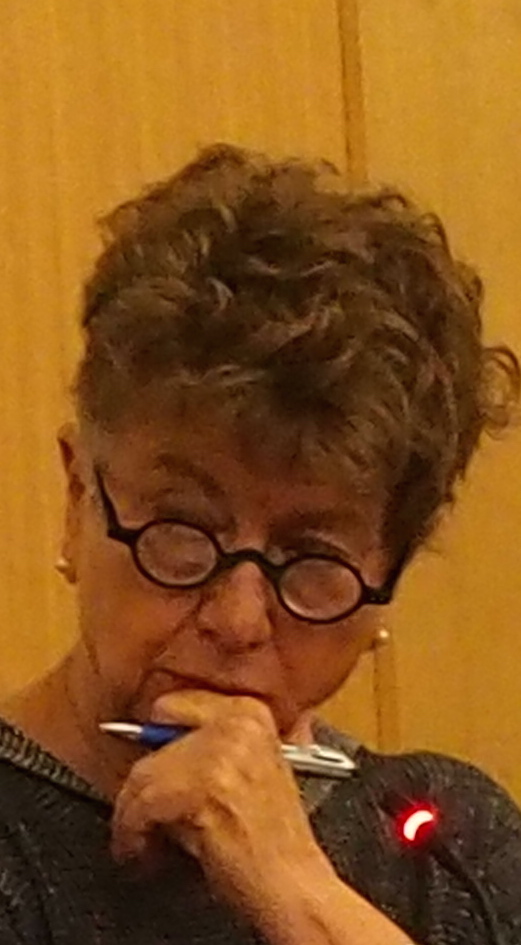From science reporter to book author, mountain lions to Mars
Colorado-based author David Baron on his journey to becoming an award-winning author of nonfiction books
Colorado-based author David Baron on his journey to becoming an award-winning author of nonfiction books
Growing up in suburban Boston in the 1970s and early 1980s, award-winning author David Baron was captivated by astronomer Carl Sagan, space exploration and National Public Radio. His dream was to be a science journalist and by the time he graduated from college he was well on his way.
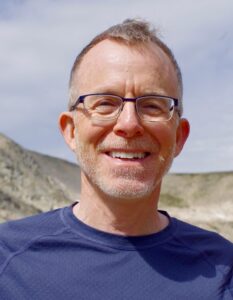
David Baron
But a dozen years later, with a portfolio of top-notch reporting to his credit, he was ready for a new challenge. It came in the form of a Ted Scripps Fellowship in Environmental Reporting, a yearlong program based at the University of Colorado, Boulder. That proved to be the path from his East Coast roots to his new home in the Rocky Mountain West.
Baron has published two books of nonfiction—The Beast in the Garden: The True Story of a Predator’s Deadly Return to Suburban America (2004) and American Eclipse: A Nation’s Epic Race to Catch the Shadow of the Moon and Win the Glory of the World (2017). His book The Martians: The True Story of an Alien Craze that Captured Turn-of-the-Century America will be released in 2025.
In this interview, edited for clarity, Baron describes his journey from the frenzied world of deadlines and broadcast newsrooms to the solitary, but no less demanding, life of a book author based in Colorado.
Q: You’ve now written three books. Were books and reading a big part of your life growing up?
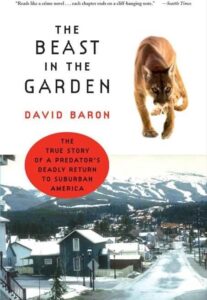
The Beast in the Garden, 2004
DB: I wasn’t a big reader. I mean I certainly read plenty of books for school and there were influential books. Henry David Thoreau’s Walden was very influential for me when I was a kid. I grew up not very far from Walden Pond, but books were not a big part of my early life.
Q: Were you interested in science or in writing or radio, any those things?
DB: Well, definitely not writing. I was very much into science. As a kid I was watching Carl Sagan’s Cosmos (A Personal Voyage). I enjoyed math and in college I double majored in physics and geology, but I did everything possible to avoid courses where I had to write papers because I hated writing papers.
Q: How did you got interested in radio?
DB: I was a big public radio fan from the time I was in junior high school. My great dream was to be a science reporter for NPR. That just seemed like, who would want to do anything else? But radio was a hobby. I was having fun (in college) doing radio on campus and then interning for NPR, eventually working summers as a substitute tape cutter on “All Things Considered.”
Q: NPR was setting national standards for excellence in reporting. You landed a plum job at NPR.
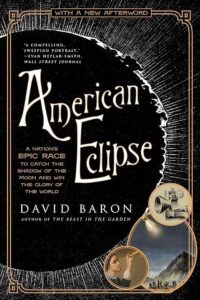
American Eclipse, 2017
DB: When I left college, I wasn’t ready to go to graduate school, and I thought I might just make a go of it for a few years doing radio science journalism. I liked the performance aspect of it. I liked producing stories, putting together the tape, the sound effects, the sound bites. I never liked writing the script, but over the years I realized, well, I did learn to write.
Q: You had your dream job. What made you think about leaving?
DB: I’d been working as a science reporter for 12 years and honestly, I was pretty burned out. I had been working so hard, just churning out stories and I think it was a bit of an existential crisis, too, because here I was in my early 30s. By then I’d achieved what I had wanted, and I wasn’t so sure it was what I wanted to continue doing. But I had no idea what else I would do.
Q: When you came to Colorado for your fellowship, did you suspect that it would be a turning point for you, including a move west?
DB: I always considered myself a New Englander, and had the snobbery of coming from New England, [thinking] that there’s no place better than Boston. It’s the most intellectual, sophisticated, and I very much enjoyed living in Boston. But when Paul, my now-husband, and I came out to Colorado in 1998, we immediately understood just how deluded we were about being such New England snobs and how much nicer life can be in a beautiful setting, with nice weather and friendly people.
Q: Was the fellowship also influential professionally?
DB: The fellowship program is not just a sabbatical. It’s not just to take time off to take classes and think. You’re supposed to have some sort of project which is usually a writing project. I could have easily done a radio project. But I decided I was going to write a long-form magazine piece because I’d never done that before, and it scared me. And if there was any way I was going to write a book, I better see if I could actually write print and not just a short article.
Q: Well your fellowship project ultimately did turn into your first book, The Beast in the Garden, and a very successful one. How did you choose the topic?
DB: I was really interested in what I saw happening with wildlife in America. People then were still thinking about wildlife populations as endangered, making sure that we didn’t overhunt animals. But there was this growing issue of urban wildlife, animals that were becoming quite adept at living among people in urban and suburban areas.
I did a bunch of stories (at NPR) on this, like deer in suburbia back East, which were becoming pests. I mean, people at first loved having the deer around. And then, when the deer started eating their gardens and causing automobile accidents, there were huge conflicts about what to do about the deer.
I did a story in Massachusetts about beavers, which, going back to colonial days, were trapped for their hides, for their pelts, but now were protected. And now beavers were becoming quite abundant and moving into the suburbs, and damming streams and flooding backyards, and people were furious about this.
I did a story about grizzlies in Montana, which were not exactly abundant, but were now protected by the Endangered Species Act and leaving the national parks and ending up on people’s back porches.
Q: You settled on a Colorado story about mountain lions which eventually became your first book, The Beast in the Garden. Was that with an eye toward staying in Colorado?
DB: The crazy thing is, I had no idea that the story I was going to tell was going to revolve around Boulder. My first semester at CU, I was looking all over the country for a good, compelling story about people living with large predators, with wolves, with alligators, with mountain lions, with grizzlies. I just happened to discover there were these two biologists in Boulder, studying mountain lion behavior and documenting how the lions were adapting to this human landscape, following the deer into town, adapting to Boulder’s welcoming landscape. And they were arguing that this was a dangerous recipe.
Sure enough, in 1991 Colorado suffered its first fatal mountain lion attack, not very far away, from a lion’s perspective, in Idaho Springs. And so it all came together with Boulder as a microcosm of what was happening in the whole country. I ended up writing a magazine piece for the Boston Sunday Globe, which was published at the end of my fellowship year.
Q: What was the motivation to expand the project into a book and how long did that process take, to go from the magazine piece to the book?
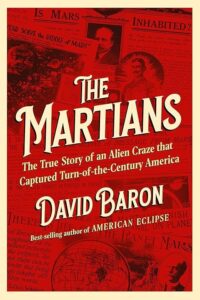
The Martians, coming in 2025
DB: Just before the fellowship started, I met with a literary agent, an acquaintance of mine that I knew from college. In fact, we worked together at the campus radio station at Yale. He had gone on to become a lawyer, and then a literary agent, and was starting his own agency and hearing me on the radio. We met for lunch, and he really encouraged me to think about writing a book, he made it sound like something that maybe was doable. I went back to Boston, back to NPR, and spent a year of evenings and weekends putting together a book proposal and then actually getting a book contract, which is what allowed us to move back to Boulder to write.
Q: Financially, being an author is so much more precarious than having a paycheck. How did you negotiate the financial part?
DB: I didn’t quit my job at NPR until I had a book contract with an advance. The advance was not big. I guess it was probably about the equivalent of my one-year salary at public radio. And I thought it might take me a year and a half to write. It took me two-and-a-half years. I had imagined that I’d be making all sorts of money in royalties. Well, most books don’t earn out their advance. The Beast in the Garden has, but it’s not like I’ve made a lot of money on it.
Q: Did you follow the same game plan for your second book as the first, having a paycheck until you had a book contract in hand?
DB: I went back and got a job again. I didn’t quit that job until I had a book contract. I knew I wanted to continue that kind of life, writing books. I just found it very satisfying. I can take as long as I want and go as deep as I want, but there’s a real danger to that which is, I could go broke.
Q: Your latest book, The Martians, will come out in 2025. It seems like a logical follow up to your second book, American Eclipse. Were you committed to a subject that would tap into your astronomy background?
DB: Actually, I was trying out all sorts of different things like self-driving cars and artificial intelligence. One day, it just came to me: the story of Percival Lowell and the canals of Mars. He was a wealthy Bostonian from the Lowell family that made its fortune in textiles in Lowell, Massachusetts. He decided in his early 40s that he wanted to be an astronomer, and founded the Lowell Observatory in Flagstaff, Arizona, specifically to study Mars.
He saw on Mars [in the 1890s] this bizarre network of straight lines he interpreted as a network of irrigation canals that the Martian civilization was using to grow their crops. It just electrified the world. And I was astonished to turn up these articles in the New York Herald and the New York Tribune, and the New York Times, writing in all seriousness about the civilization on Mars, and attempts to communicate with the Martians, and what we might learn from the Martians. Of course, it was wrong, and it has gone down in history as one of the great embarrassing episodes in science.
And then people are talking a lot about Mars today. We’re sending our Rovers there. We’ve been talking for a long time about sending astronauts there. Elon Musk wants to start building cities there. And there’s, of course, plenty of excitement still about alien life. There seemed to be a lot that resonated with today, and it had some connection to the American West, more to Arizona than Colorado, although there is a Colorado connection, too. And a Boston connection. I mean, that’s me. I want a good story to tell, but I also want to feel like I’m an appropriate person to tell the story.
When I have an idea that the deeper I go, the richer it becomes, it’s like looking at some fractal image where the more I zoom in, the more detail there is, and the more beautiful it is. I’m making it sound like I knew that it would work. It took me two and a half years to write the book proposal with no income, no guarantee that anything was going to come of it, but I finally got the contract. It all worked out.
Click here for more from Meg Moritz.
